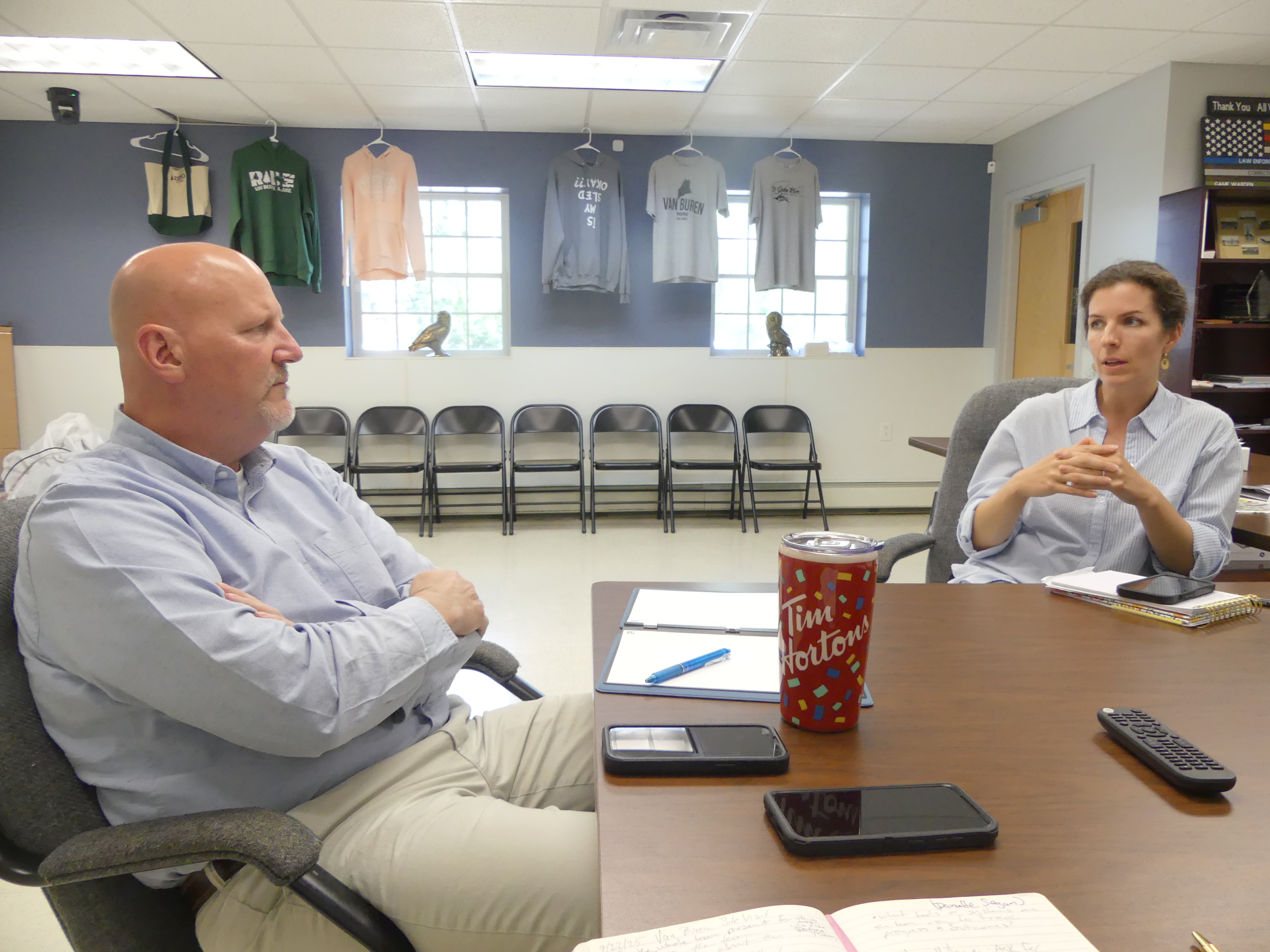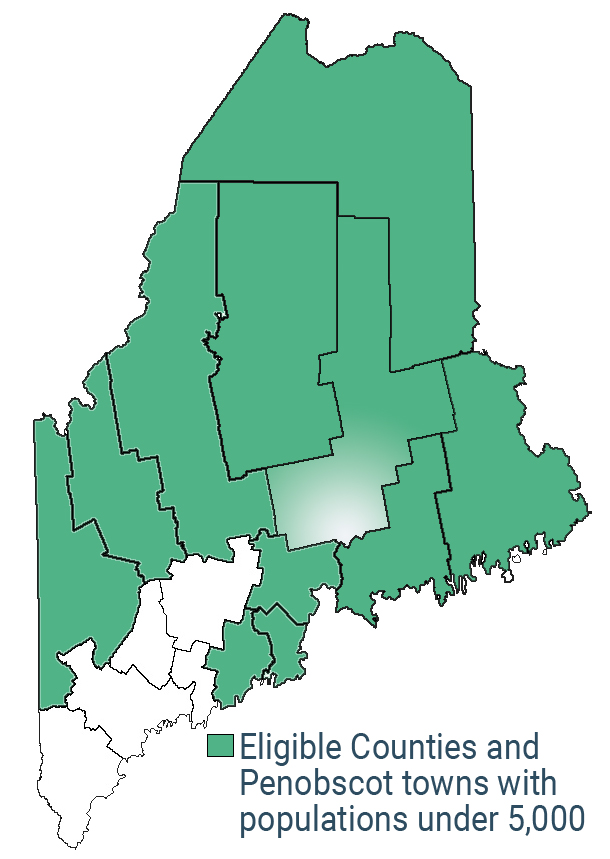Mission
The Maine Service Fellows program was formed to help rural communities by assigning someone to devote full-time effort to a critical need. It recognizes that some communities need one more set of hands to accomplish local goals.
The mission of the Maine Service Fellows program is to
- Provide rural, underserved communities with a resource to address critical needs;
- Increase the opportunities for recent college graduates to devote a year of service to communities and use their skills to make a difference;
- Attract and retain people with a passion for public service, especially in rural areas; and
- Strengthen civic engagement and community resilience by involving community residents as well as Service Fellows in volunteer-based solutions.

Overview
Qualified organizations apply to Volunteer Maine to sponsor a Service Fellow in an eligible community. The sponsor should be prepared to support the Service Fellow for up to 2 years.
Service Fellows devote full-time effort (1700 hours/42.5 weeks) to examining and understanding the need, exploring solutions, and engaging citizens in identifying and implementing the solution. They live in the community and serve through a sponsor organization that is responsible for providing supervision, connections, and the essential materials or tools to accomplish the approved work plan.
Volunteer Maine works with a sponsor organization identified by the community as the lead contact for the project. The program director for Maine Service Fellows is a member of Volunteer Maine's staff. The director helps the sponsor organization finalize the annual work plan, develop a role description including qualifications, recruits potential Service Fellows, helps sponsors select the individual Fellow, convenes and trains sponsor supervisors, convenes and trains Service Fellows, and administers Service Fellows' benefits including the living allowance.
Volunteer Maine covers the cost of Service Fellows' benefits and program-wide training through private donations and a modest appropriation from the legislature. Participating communities contribute a small cost-share of $1,800 (2025).
How To Apply
Municipalities and Non-Profit Organizations can apply to host a Maine Service Fellow through an online application during the open application period. Applications are generally open from September through November each year for any open Site Host slots. Applications for Site Hosts for 2026-2027 are closed. If you're interested in becoming a host site and want more information, please reach out to Maine Service Fellows Program Manager Maureen Kendzierski at service.commission@maine.gov to learn more.
- Community Eligibility
-
Rural communities with a need and project in one of the allowed categories may request the aid of a Maine Service Fellow through an application process.

Rural is defined by using the US Dept of Agriculture's Rural-Urban Continuum Codes. With one exception, communities must be in a county with a RUCA code between 6 and 10. This means eligible communities are in these counties:
Aroostook, Franklin, Hancock, Knox, Lincoln, Oxford, Piscataquis, Somerset, Waldo, and Washington.
Towns in Penobscot County that are outside the Greater Bangor region and have populations under 5,000 are also eligible to participate.
Host applications can be submitted by a single community, a group of communities, or an entire county. In each case, one organization must lead the project and fulfill the sponsor obligations.
- Project Categories
-
Community projects must be within one of the areas listed below.
General areas
- COVID 19 recovery
- Housing including eviction prevention
- Workforce development
- Substance use prevention and recovery
- Public health including mental health
Climate Action areas
- Coastal zone
- Community resilience (including climate action planning)
- Transportation
- Energy
- Housing
- Land and fresh-water preservation
- Education (k-12 and community)
- Public health
Service Fellows must devote 20% of their annual work plan to developing regional networks of volunteer programs and leaders.
- Sponsor Qualifications
-
Sponsor organizations request the aid of a Maine Service Fellow on behalf of the community and submit the application to host a Service Fellow. The community project and work plan may be a collaboration among several organizations but one of the collaborators must be identified as the Service Fellow sponsor and lead project contact for Volunteer Maine. The sponsor takes responsibility for the Maine Service Fellow and commits to fulfilling the obligations of this role.
Eligible sponsors include public or private non-profits, state/county/local units of government, educational institutions, faith-based organizations, federally recognized tribes, and regional organizations based in the communites impacted.
Organizations that currently have AmeriCorps members, VISTAs, or other service-related members are not eligible to sponsor Service Fellows.
Service Fellows will not be assigned to a community project if the assignment will result in displacement. That means,
- an employer may not use a Fellow to displace an employee or position, including partial displacement such as reduction in hours, wages, or employment benefits.
- a Fellow may not be used to inhibit the advancement of employees within an organization.
- a Fellow may not perform any services or duties or engage in activities that would otherwise be performed by an employee as part of the assigned duties of said employee.
- a Fellow may not perform services or engage in activities that will supplant the hiring of employed workers or are services, duties, or activities with respect to which an individual has recall rights pursuant to a collective bargaining agreement or applicable personnel procedures.
- a Fellow cannot replace an employee who was recently reassigned, discharged, or who resigned. A Fellow cannot replace an employee who is on leave (terminal, temporary, vacation, emergency, or sick) or who is on strike.
- Sponsor Obligations
-
Appoint a member of the sponsor organization staff to be the lead contact for Volunteer Maine and the technical supervisor. This person must spend at least 50% of their time working from the same location as the Service Fellow. This ensures the two develop a working relationship that meets the needs of the Service Fellow and the project.
- As lead contact, the person works with Volunteer Maine to finalize the Service Fellow work plan, select the candidate for the project, help the selected candidate relocate and find housing (if applicable), pay the cost share to Volunteer Maine, and become the most knowledgeable about the Maine Service Fellows program. The lead contact also is responsible for ensuring the sponsor organizations policies and procedures permit non-employees to serve at the agency, use agency resources, receive reimbursement for local travel, and are covered by the same accident, injury, and liability insurances as agency clients, interns, or volunteers.
- As technical supervisor, the person commits to orienting the Fellow to the community and the project partners or stakeholders, holding regular one-on-one supervision meetings (at least every two weeks), providing guidance on implementing the project and its workplan, and connecting the Fellow with training and professional development opportunities. This person is also the one designated by the sponsor to ensure the Fellow has appropriate workspace, tools, and technology. The person will also participate in technical supervisor orientation and quarterly meetings, verify hours served by the Service Fellow, submit semi-annual progress reports, and participate in performance assessments.
Recruit and appoint someone to be the Community Liaison for the Service Fellow. The Community Liaison helps the Service Fellow integrate into the community, even when the person is a local. The person in this role is expected to be well connected in the community, has the time to make social introductions, link the Service Fellow to activities of personal interest, and check in with the Service Fellow throughout their service term.
Acknowledge the association/partnership with Maine Service Fellows and Volunteer Maine. Funding for the program comes from both public sources and private donors. Acknowledging the relationship is critical because it helps funders see where their investment is at work and who is serving in the communities.
Sponsors are encouraged, but not required, to provide additional benefits which may include other travel allowances, tuition reimbursements, housing, or additional training opportunities. These are opportunities for project partners to contribute to supporting the Service Fellow and, when identified before recruitment starts, increase the interest of candidates applying to the program.
- Volunteer Maine obligations
-
Maine Service Fellows is a program of Volunteer Maine, the state service commission. As the administrator, the Commission assigns a staff member to be the program director and work with the Advisory Committee that oversees the program. In addition, the Commission has these specific responsibilities:
- Accept applications to host a Service Fellow and manage the review/selection process conducted by reviewers appointed by the program advisory committee. The process will include consideration of the written application as well as information offered by applicants in an interview prior to selection.
- After notifying applicants of selection status, provide technical assistance to sponsor organizations regarding final work plans, role descriptions, and training/professional development plans.
- Develop and execute Memorandum of Understanding with the sponsor organization.
- Assist with promotion of the service opportunity and accept candidate applications.
- Participate in Service Fellow selection process by determining candidates' basic eligibility, joining the site interviews of candidates, and ensuring sponsors are able to conduct the criminal history portion of background checks.
- Execute the Fellow Service Agreement prior to the Service Fellow's first day at the sponsor site. Ensure the individual completes applications or forms needed to set up payment of living allowance, enrollment in health insurance (if needed), and other benefits. All expenses associated with the living allowance, health insurance, member assistance plan, and other benefits will be paid by the program.
- Conduct orientation for sponsor supervisors and Service Fellows prior to the Service Fellows' first day of service.
- Manage the systems for tracking Service Fellows' hours, payment of living allowance, submitting progress reports, and reporting to funders.
- Provide general supervision and team-building opportunities as well as enrichment trainings throughout the year.
- Coordinate with sponsor supervisors to address any Service Fellow performance issues.
- Provide technical assistance to sponsor supervisors as needed.
- Conduct mid-year and end of year annual performance reviews of Service Fellows with the help of sponsor supervisors.
- Report accomplishments to the advisory committee, Commission, and funders.
- Community Application
-
There are two steps in the application process.
1. Complete our online application before November 20, 2025
2. Programs that are selected to host will have until December 5, 2025 to submit a detailed workplan and role description to the Maine Service Fellows Program Manager.
For questions or to discuss your potential project, contact Volunteer Maine at (207) 816-2707.
- Supporting Partners
-
The Maine Service Fellows program is funded as a public-private partnership. Private sector donors underwrite the cost of supporting a Fellow for a year. These contributions extend the reach of the program when matched with very limited public funding. Private donors help place Fellows in more rural, financially stressed communities. Locally, the host organization and community partners cover project materials, supervision, work materials for the Fellow (internet, phone, office supplies, etc.) but the funds to support the Fellow’s service (living allowance, health insurance, etc.) are fully covered by the Commission.
The Maine Volunteer Foundation, the nonprofit partner of Volunteer Maine, leads the private fundraising efforts. Individuals, businesses, foundations, and others who may want to invest in the program should contact the Maine Volunteer Foundation Here.
Anyone who would like to support recruitment or training of Fellows can contribute to the Foundation directly online. Donate today
Learn more about the Maine Volunteer Foundation (MVF). MVF website